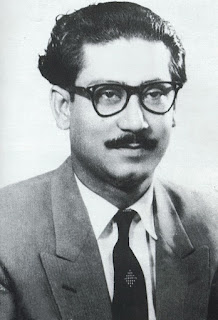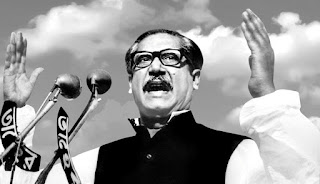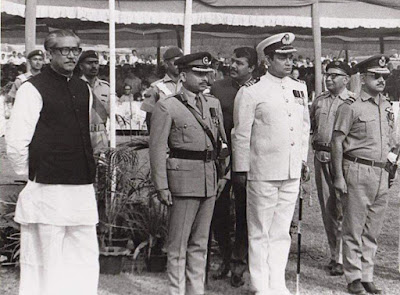 |
| Bangabandhu Sheik Mujibur Rahman |
Bangabandhu
Sheik Mujibur Rahman, (1920-1975) Father
of the country and first leader of Bangladesh (26 March 1971 to 11 January
1972). Sheik Mujibur Rahman was conceived on 17 March 1920 in the town
Tungipara under Gopalganj subdivision in the area of Faridpur. His dad Sheik
Lutfar Rahman was a serestadar in the common court of Gopalganj. Mujib, the
third among six siblings and sisters, had his essential instruction in the
nearby Gimadanga School. His initial training languished over around four years
because of eye issues. He passed his Matriculation from Gopalganj Missionary
School in 1942, Intermediate of Arts from Calcutta Islamia College in 1944 and
BA from a similar school in 1947.
Mujib
demonstrated the capability of initiative since his school life. While an
understudy of Gopalganj Missionary School, AK Fazlul Huq, the then Chief
Minister of Bengal, came to visit the school (1938). The youthful Mujib is said
to have composed a disturbance to awe the main priest about the discouraged
circumstance of the area. While an understudy in Islamia College he was chosen
general secretary of the College Students Union in 1946. He was a dissident of
the Bengal Provincial Muslim League and an individual from the All India Muslim
League Council from 1943 onwards. In legislative issues he had been an intense
devotee of hs suhrawardy.
Amid
the general races of 1946, Sheik Mujib was deputed by the Muslim League to work
for the gathering competitors in the Faridpur region. After parcel (1947), he
got himself conceded into the University of Dhaka to contemplate law yet was
not able finish it, since he was ousted from the University in mid 1949 on the
charge of 'inducing the fourth-class workers' in their disturbance against the
University specialist's impassion towards their authentic requests.
Sheik
Mujibur Rahman was one of the vital coordinators behind the arrangement of the
East Pakistan Muslim Students League (1948). Truth be told, Sheik Mujib's
dynamic political vocation started with his decision to one of the three posts
of joint secretaries of the recently settled East Pakistan Awami Muslim League
(1949) while interned in prison. The other two joint secretaries were Khondakar
Mostaq Ahmad and AK Rafiqul Hussain. In 1953, Sheik Mujib was chosen general
secretary of the East Pakistan Awami Muslim League, a post that he held until
the point that 1966 when he moved toward becoming leader of the gathering. It
was because of Mujib's drive that in 1955 the word 'Muslim' was dropped from
the name of the gathering to influence it to sound common. It is characteristic
of his secularist state of mind to governmental issues that he created after
1947.
To
give full time to the authoritative undertakings of the Awami League, Sheik
Mujibur Rahman surrendered from the bureau of ataur rahman khan (1956-58)
subsequent to serving for just nine months. Amid the season of general Ayub
Khan, Mujib had the nerve to resuscitate the Awami League in 1964, however his political
master, Suhrawardy, was agreeable to keeping political gatherings old and work
under the political amalgam called National Democratic Front for the
reclamation of protected manage in Pakistan. Mujib, all things considered, was
at that point very baffled about the idea of Pakistan. The feeling that he got
as an individual from Pakistan's Second Constituent Assembly-cum-Legislature
(1955-1956) and later as an individual from Pakistan National Assembly
(1956-1958) was that the state of mind of West Pakistani pioneers to East
Pakistan was not one of fairness and clique.
 |
| Bangabandhu Sheik Mujibur Rahman |
Sheik
Mujib was one of the first among the dialect development prisoners (11 March
1948). His address on 21 September 1955 in the Pakistan Constituent Assembly on
the topic of Bangla dialect is imperative. Asserting the privilege to talk in
his primary language, Sheik Mujibur Rahman stated:
'We
need to talk in Bengali here, regardless of whether we know some other dialect
or not it is important little for us. On the off chance that we feel that we
can convey what needs be in Bengali we will talk dependably in Bengali despite
the fact that we can talk in English too. In the event that that isn't
permitted, we will go out, however Bengali ought to be permitted in this house;
is our stand. In another address (25 August 1955) what Sheik Mujib said in the
Constituent Assembly in challenge the difference in classification of the
region from East Bengal to East Pakistan is similarly related. ' Sir, you will
see that they need to put the word 'East Pakistan' rather than 'East Bengal'.
We have requested such a significant number of times that you should utilize
[East] Bengal rather than [East] Pakistan. The word 'Bengal' has a history, has
a custom of its own....'
Sheik
Mujibur Rahman developed in political greatness in the mid 1960s. Through his
enamoring arranging capacity he could recover the Awami League from intra party
legislative issues and exits of various groups from the gathering's standard.
An attractive coordinator, Sheik Mujib had built up his full summon over the
gathering. In 1966, he reported his well known six-point program what he called
'Our' Charter of Survival'. The focuses are:
1)
an elected State and presentation of parliamentary type of government in light
of all inclusive grown-up establishment; 2) all divisions with the exception of
guard and outside issues will be vested in the hands of the unifying units or
common governments; 3) isolate monetary standards for two states or viable
measures to prevent flight of capital from East Pakistan to West Pakistan; 4)
exchange of all privileges of tax collection to the states; 5) autonomy of the
states in worldwide exchanges; lastly 6) privileges of the states to make'
volunteer army or para-military powers for self-preservation. To put it
plainly, the program imagined another way to deal with political life. In
letters and soul, the Six-Point Program implied virtual freedom for East
Pakistan. In spite of the fact that preservationist components of every
political gathering took a gander at it with horror, it energized the creative
ability of the more youthful age immediately, especially the understudies,
youth and regular workers.
Following
the introduction of the testing Six-point program by Mujib, the Ayub
administration put him behind the bars. A subversion case, known as agartala
scheme case formally named as State versus Sheik Mujibur Rahman and Others, was
brought against him alongside 34 others. Greater part of them were Bangali
officers and servicemen in Pakistan Air and Naval powers. They additionally
included three senior Bangali government employees. As Mujib was at that point
in jail he was demonstrated captured as number one charged. He was accused of
plotting against the province of Pakistan together with the other co-blamed. As
indicated by the assertions, Sheik Mujibur Rahman and the other blamed were
furtively intending to isolate East Pakistan by compel with the assistance of
India. The counter-hostile move, in any case, turned out to be
counter-beneficial. The trial of the case in an uncommon council in the Dhaka
Kurmitola Cantonment blended up Bangali feeling and notion against Pakistani
overbearing state of mind to East Pakistan. Amid the trial in the Agartala
Conspiracy Case, Mujib's charm became further and nearly the entire country
stood up in challenge of the trial of their pioneer. The mass development,
composed particularly by the more youthful age, achieved such an energy in mid
1969 that the Ayub administration endeavored to maintain a strategic distance
from a looming common war in the nation by pulling back the case. Sheik Mujib
was discharged on 22 February 1969 genuinely.
On
the next day of his discharge, the Sarbadaliya Chhatra Sangram Parishad (All
Parties Students Action Committee) which ended up being the best political and
social power in convincing the legislature to free Sheik Mujib unequivocally,
sorted out a mass gathering to Sheik Mujibur Rahman at ramna racecourse (now,
Suhrawardy Udyan). For the benefit of the Sangram Parishad Tofael Ahmed, the
leader of the Sangram Parishad, gave on Sheik Mujibur Rahman the title of
'Bangabandhu' (Friend of the Bangalis). In him, they saw a sort of
relinquishing pioneer who languished imprison terms over around twelve years
amid the 23 years of Pakistani run the show. Twelve years in prison and ten
years under close reconnaissance, Pakistan to Sheik Mujib ended up being more a
jail than a free country.
 |
| Bangabandhu Sheik Mujibur Rahman |
The
main ever broad decisions of Pakistan in December 1970 made Bangabandhu Sheik
Mujibur Rahman the sole representative of East Pakistan. Under his authority,
the Awami League won 167 (counting 7 ladies saved seats) out of 169 seats
designated to East Pakistan in the Pakistan National Assembly. The general
population gave him the supreme command for his Six-point precept. Presently
the ball was in his court to execute it. Bangabandhu Sheik Mujibur Rahman at a
serious service hung on 3 January 1971 at Ramna Race Course with all the East
Pakistan agents guaranteed never to go amiss from the six-moment that
surrounding the Constitution for Pakistan.
In
light of the current situation, General Yahya's military junta and Z.A Bhutto,
the chose pioneer of West Pakistan, schemed not to permit Bangabandhu Sheik
Mujibur Rahman to frame the administration in the middle. On 1 March 1971,
President Yahya Khan delayed singularly the Dhaka National Assembly meet booked
to be hung on 3 March. The declaration activated off the general unsettling in
East Pakistan. Accordingly, the Bangabandhu required a hard and fast non-participation
development in East Pakistan. The entire territory bolstered him. Over the span
of non-collaboration (2-25 March 1971), the whole thoughtful organization in
East Pakistan went under his control and moved by his mandates. He moved toward
becoming, actually, the true head of government for the area. In the
expressions of Evening Standard (a London Daily):
'Sheik
Mujibur Rahman now gives off an impression of being the supervisor of East
Pakistan, with the entire help of the populace. Rahman's home in Dhanmondi,
definitely known as Number 10 Downing Street in impersonation of the British
Prime Minister's habitation, has been blockaded by civil servants, lawmakers,
financiers, industrialists and individuals from all kinds of different
backgrounds' (12 March 1971).